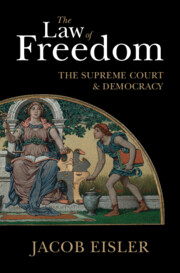Book contents
- The Law of Freedom
- The Law of Freedom
- Copyright page
- Dedication
- Epigraph
- Contents
- Preface
- Acknowledgments
- Introduction
- 1 The Counterpopular Dilemma
- 2 Constitutionalism and the Counterpopular Dilemma
- 3 Traversing the Dilemma
- 4 One Person, One Vote
- 5 Campaign Finance
- 6 Parties in Democracy
- 7 Race and Elections
- Conclusion
- Selected Bibliography
- Index
4 - One Person, One Vote
The Triumph of Minimal Procedural Equality
Published online by Cambridge University Press: 06 July 2023
- The Law of Freedom
- The Law of Freedom
- Copyright page
- Dedication
- Epigraph
- Contents
- Preface
- Acknowledgments
- Introduction
- 1 The Counterpopular Dilemma
- 2 Constitutionalism and the Counterpopular Dilemma
- 3 Traversing the Dilemma
- 4 One Person, One Vote
- 5 Campaign Finance
- 6 Parties in Democracy
- 7 Race and Elections
- Conclusion
- Selected Bibliography
- Index
Summary
Chapter 4 examines the most stable point in election law – one person, one vote – to show that judicial contestation over freedom has always characterized modern election law. While one person, one vote is now a settled and widely accepted principle, its reception has been far more varied. Jurists and activists have celebrated it as advancing democratic fairness and breaking the rural stranglehold over state legislatures. Yet scholars have criticized it as lacking a clear or logical foundation. This chapter challenges that orthodox critique by reconstructing the legal development and moral significance of one person, one vote. The idea that malapportionment is unconstitutional, far from being woven from whole cloth in Baker v. Carr, was fiercely debated in the first half of the 20th century. The further development of one person, one vote further examined how a requirement of equipopulous districting advances minimum standards of legitimate democratic self-rule. As a normative innovation, one person, one vote represents the culmination of a hard-fought debate, the conclusion of which established that minimal procedural egalitarianism is morally obligatory in a liberal democracy.
Keywords
- Type
- Chapter
- Information
- The Law of FreedomThe Supreme Court and Democracy, pp. 117 - 157Publisher: Cambridge University PressPrint publication year: 2023

